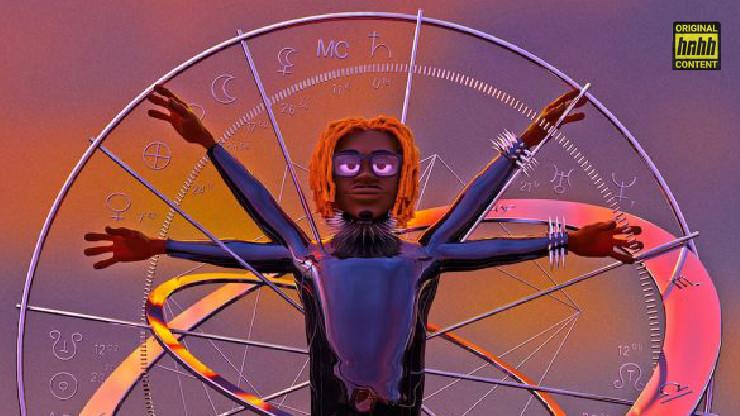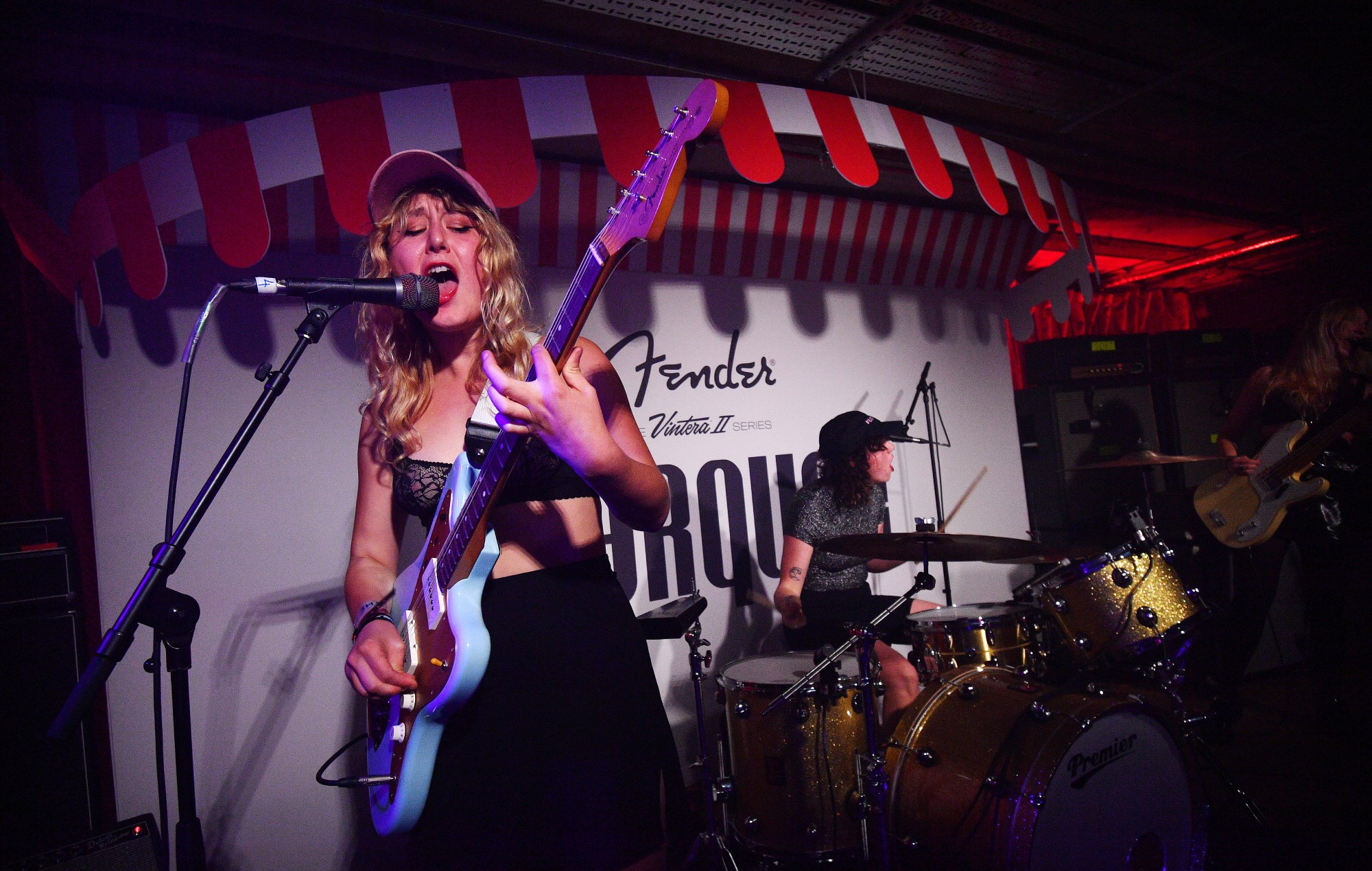Gunna is living life through rose-colored glasses, and with the release of WUNNA, we get to see life through those same pink lenses. This idea translates not only to the music and his aesthetic, but his optimistic, relaxed view on life.
WUNNA was recorded almost entirely in Jamaica. As we get to see glimpses of Gunna’s surroundings in the album’s two-part documentary, the sound we’re introduced to on WUNNA begins to make sense: as a whole, it’s serene, energizing and uplifting. Meanwhile, his tropical environment could be described similarly.
However it isn’t just the vibe on WUNNA that is a level-up for the rapper. It’s immediately clear that both time and attention were poured into WUNNA. The cover art is a detailed cartoon yet life-like image of Gunna, surrounded by astrological symbols, created in the likeness of the Vitrun Man. The colour itself is the perfect depiction of the album: a purple-pink hue, with a yellow sheen to it– the same palette you might find when watching a breath-taking sunset in a foreign location. The back cover is not just a simple tracklisting, it provides you with the credits that would usually go unseen, from producers to engineers. The background is a starry night– a meditative and tranquil view.
Simply unpacking the artwork is enough to show you the care and precision that Gunna put into this body of work– but it’s just as noticeable throughout the 18-song tracklist. Despite the trend for lengthier tracklists, it’s a difficult feat to pull off. Gunna does it successfully, and some of the acknowledgement needs to go towards the producer Wheezy, who not only helped executive produce the album, but has production credits on half of the songs as well. With his guiding hand, the album plays smoothly and cohesively all the way through.
“Argentina” kicks it off, ensuring we’re already thinking about somewhere foreign; it’s as though Gunna is preparing us for the vacation we’re about to take with him. Gunna’s voice comes in hazily alongside the strumming of a melancholic guitar, but despite any lackadaisical flows, his voice is at its sharpest throughout this album. His squeaky cadence and slight drawl are still intact, to be sure, but he’s cleaned up his rough edges– perhaps a simple matter of the care that was put into the mixing and mastering process.
“Argentina” eases us into the album confidently, where “Gimmick” picks up the energy a notch and assures us we’re well on our way. Still, the energy doesn’t necessarily surpass that of “Gimmick” throughout the project, even on the hard-hitting “Rockstar Bikers & Chains.” On the latter, screeching guitar and scratchy hi-hats are accompanied by a chorus of forced breathes, making for one of Gunna’s most unique ad-libs– and taking a cue from Roddy Ricch, in the sense that he delivers a strange sound which becomes one with the beat.
Prior to the album’s release, Gunna dropped off the title track, “WUNNA,” which finds placement in the middle of the tracklist, acting as an interlude. The song is a seemingly structureless romp in the booth, with Gunna free associating words and humming melodies. It feels natural just as much as it feels spontaneous. This word-association idea is one that Gunna explored on other songs, and it shows not only his growth as an MC but his open-mindedness. Much in the way Young Thug was avant-garde with his vocal boundaries and quirky lyrics, Gunna too is showcasing this type of outside-the-box lyrical approach. He’s packing a lot of punch into quick, short bars that seem to follow in thought somewhat vaguely. Perhaps this growth is also fostered by his familiar collaborators, some of whom, like “Addys” guest Nechie, are childhood friends. Surely it’s easier to try new things when you’re surrounded by familiar faces, ones that have been encouraging you and at your side since day one– including Young Thug, Turbo, and Wheezy as well.
“Addys” for its part is an unashamed boast about Gunna’s drug habits. The hook is a quick spurt of a word: “addy” Gunna spits, almost stopping short of finishing the word. Even with his drug-addled pursuits, he’s honest: “Spin the block, we got the addy / Wake up, I pop me a Addy / Hard to stop poppin’ these Addys.” This type of momentary frankness is littered throughout the album, bringing the listener that much closer to Gunna in the process. Elsewhere, on his collaboration with Lil Baby “Blindfold,” he remembers: “BET was trippin’, how I didn’t get an award? (How?) / You got me annoyed.”
“Met Gala” helps usher us into the final 8 songs, which includes some of the album’s strongest outings, and is a fleet of non-skippable records. The mellow, syrupy record finds Gunna flowing easily, except when he has a point to make in another fit of honesty. His vocal octave increases a notch, his passion and urgency clear: “I ain’t get this shit just from askin’, I made this shit happen and / passion, it played a big part I ain’t get this bitch off of mackin’, it came off of actions and / fashion and staying the course.”
These types of lines become even more impactful because of their rarity. Gunna is the master of drip, and this translates extremely well into lyrics of a similar nature; but sometimes the drip he offers is for a higher level of being. As he shared about the album: “I wanted my fans to have a peek into my world, a way for them to know that regardless of what you go through, what you’ve been through, you can be successful.”
The song that follows, “Nasty Girl/On Camera,” is strictly for the drip, though. It’s a sleek banger that becomes even more exciting with its two-part nature. Wheezy is once again behind the boards, with each electronic key feeling like a literal drop in the water. Where “On Camera” ends the record in a smooth, slinking fashion, so too does “Cooler than a Bitch” pick it right back up. Gunna and Roddy Ricch skate atop the guitar-driven beat, silky and onomatopoeic in its all around breeziness.
This light and breezy aspect of the production is a theme across the album, and, again, would seem to recall the YSL team members’ surroundings while creating WUNNA. “On Some” almost acts as a personal mantra– it’s woozy background music adding to the effect– while Gunna big ups himself, and if you’re singing along, you’re hyping yourself too: “It feel like I’m on some / I don’t back down to no one.” “Top Floor” is a high-rise anthem, a quick survey of the land from Gunna’s perspective, allowing you to see exactly what he sees. Where Travis Scott has a habit of monopolizing a song with his sound, Gunna manages to keep control of the vibe here, with a record that will surely be added to summer playlists around the world. It’s an outdoor, love-my-life type of record, which is actually what many of the songs on WUNNA are.
It all culminates in a pair of farewell records that ensure the listener leaves the album with a positive mindset: “Do Better” and “Far,” perhaps the two most important songs on the tracklist, too. “I wanna see you do better,” Gunna croon-raps over the whimsical, distorted string production. It’s an idea that should resonate with literally, everyone in its simple and straightforward nature. It seems like the perfect way to lead us into the heartfelt ballad that is “Far.” Young Thug pops up for his second appearance on this ode to their come-up and friendship. Gunna himself is in awe of just where he’s come:
“I know they ain’t think we’d make it far / We done bought a hundred cars We done fucked a hundred broads Went against the odds / Whole life, was trippin’ hard, now we livin’ large / The whole world wouldn’t have ours, they know who we are.”
Even with all Gunna’s prosperity so far, including a #1 album with WUNNA, there’s always more to achieve, and more avenues to explore, musically or otherwise. This is the type of attitude that we should each carry towards our own lives and careers. Thus, as much success as Gunna may have with WUNNA, we should repeat Gunna’s own words back to him: I wanna see you do better.







